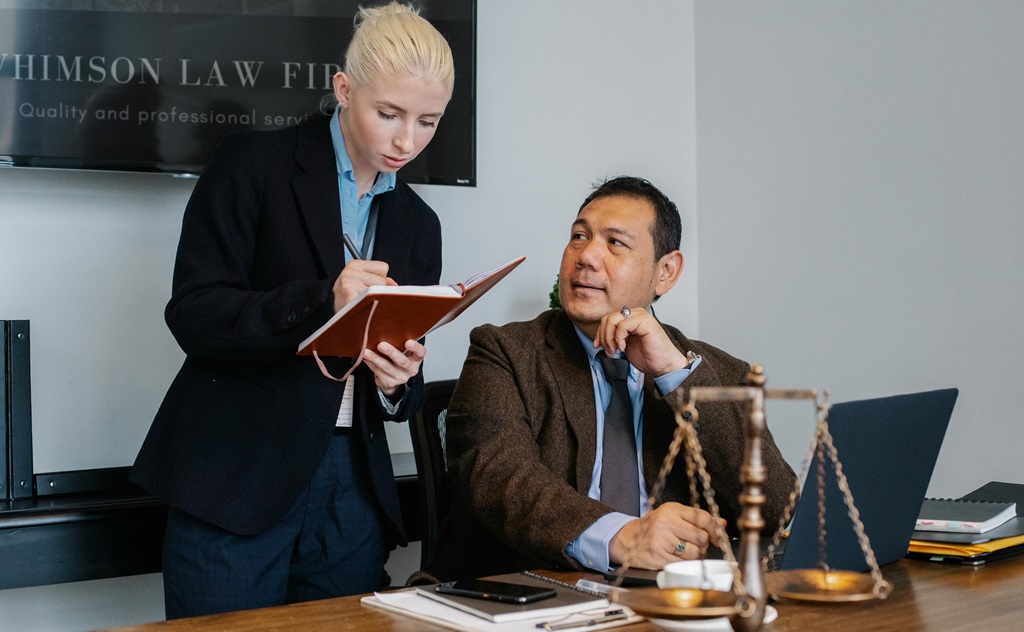While executive secretary interview questions will vary based on the specific job you’re interviewing for, there are certain standard questions you should be prepared to answer. However, merely knowing these questions isn’t enough. To truly stand out, it’s crucial to understand and articulate your unique strengths. This is where tools like the HIGH5 strengths assessment can be invaluable. By identifying your top strengths, you can tailor your responses to showcase how your natural talents align with the role’s requirements. This strengths-based approach not only helps you answer questions more effectively but also demonstrates to potential employers how you can bring unique value to their organization.
Knowing which questions to expect and how to answer them can help you stand out from other applicants. On the other hand, failing to demonstrate your knowledge and skills may lead to a poor interview.

In this article, we’ll look at some of the most common executive secretary interview questions and provide tips on answering them effectively.
What Skills Are Needed for the Executive Secretary Position?
Before diving into the questions, it’s crucial to understand what employers seek in a potential executive secretary. While having these skills and traits in mind is beneficial, truly understanding your unique strengths can give you a significant advantage. The HIGH5 strengths assessment can help you identify your top strengths, allowing you to articulate how these align with the role’s requirements. For instance, if ‘Adaptability’ is one of your top strengths, you can confidently discuss how this enables you to thrive in the dynamic environment of an executive secretary role. By leveraging your strengths, you’ll be better prepared to answer any question that comes your way and demonstrate your unique value to potential employers.
Multitasking skills
As an executive secretary, it is essential to manage multiple tasks simultaneously. How have you honed your multitasking skills in the past? If you aren’t sure, think of an example in which you had to juggle several tasks simultaneously.
Communication skills
The executive secretary position requires excellent communication and interpersonal skills. How do you ensure that your communications are clear and concise? Describe a situation where you used effective communication to achieve a successful outcome.
Organization skills
Being organized is an essential skill for an executive secretary. Give examples of how the organization helped you to save time or reach goals effectively in past positions. What strategies have you developed over the years to stay organized and productive?
Interpersonal skills
Interpersonal skills are vital for any role, especially for executive secretaries interacting with many people daily. Talk about some of the relationships you have built with others in prior roles and how your interpersonal skills helped to make those relationships successful.
Time management
Time management is another critical skill for executive secretaries. How do you plan your days and prioritize tasks to ensure everything gets done on time? Describe a situation where your effective use of time resulted in a positive outcome.
Problem-solving skills
Problem-solving abilities are essential for executive secretaries as they often need to think independently and develop creative solutions to complex issues or problems. Talk about a problem that you solved in the past using critical thinking or ingenuity.
Attention to details
The job of an executive secretary requires an eye for detail. Describe how your attention to detail helped you succeed in past positions. Give an example of a situation where paying close attention to the parties resulted in a successful outcome.
By preparing for these common executive secretary interview questions, you can put yourself in a position to make the best impression possible and stand out from other applicants.
Pro Tip From HIGH5
Before your interview, take the HIGH5 strengths assessment to identify your top strengths. Then, for each skill mentioned in the job description, think of a specific example where you’ve used one of your strengths to excel in that area. This approach will help you provide concrete, personalized answers during your interview.
17 Executive Secretary Interview Questions
Let’s now get to the actual questions you might be asked during an executive secretary interview. For each question, we’ll cover why the question is vital to employers and what the interviewer is looking for in your answer, and a model answer you can use to craft your response.
General Interview Questions
1. What makes the role of an executive secretary uniquely unique?
Why this is important: An executive secretary provides executives or management with a unique combination of administrative, secretarial, and organizational support. This question helps the interviewer understand your knowledge and appreciation for the position and if you have any unique ideas that might help improve the role.
Model Answer: I believe the role of executive secretary is uniquely special because it requires a mix of technical expertise in organization and communication, as well as interpersonal skills such as diplomacy, problem-solving, and emotional intelligence.
It’s also a dynamic role where no two days are alike – there’s always something new to learn or a challenge to tackle.
2. Please share with us a bit of your experience.
Why this is important: The interviewer wants to know about your experience in relevant roles and how this could benefit their organization.
Model Answer: I have worked as an executive secretary for the past five years, providing secretarial, administrative, organizational, and communication support to various executives.
I developed effective strategies for staying organized and meeting deadlines during my role. I also worked closely with other team members on multiple projects and developed strong relationships.
3. What does your ideal workday look like?
Why this is important: The interviewer wants to understand how you would manage your workload effectively if hired.
Model Answer: My ideal workday consists of planning out tasks ahead of time and breaking them into manageable chunks. I prioritize tasks based on urgency and importance to ensure that projects are completed on time.
In addition, I always look for ways to streamline processes or use technology effectively to increase efficiency. I also take regular breaks throughout the day to stay focused and energized.
4. What areas do you excel in, and what do you find challenging?
Why this is important: This question helps the interviewer understand your self-awareness and how you leverage your strengths while addressing areas for growth. By taking the HIGH5 strengths assessment before the interview, you can provide a more insightful and data-driven response. For example, if ‘Problem Solver’ is one of your top strengths, you could explain how this allows you to excel in managing complex tasks or resolving conflicts. At the same time, you can discuss how you’re working on developing areas that don’t come as naturally to you, demonstrating your commitment to continuous improvement.
Model Answer: One of my biggest strengths is managing multiple tasks simultaneously while ensuring accuracy and attention to detail. I am also very organized and have strong communication skills, which helps me to collaborate with team members and build relationships effectively.
One area that I find challenging is managing competing priorities promptly – this requires a lot of time management and clear communication to ensure all tasks are completed on time without sacrificing quality.
5. How would you handle an angry customer or business partner?
Why this is important: This question assesses your ability to stay professional and remain composed during difficult situations, which is essential for executive secretaries.
Model Answer: If faced with an angry customer or business partner, my priority would be de-escalating the situation by actively listening to understand their issue and remaining calm throughout the conversation.
I aim to develop mutually beneficial solutions that address the customer’s needs and protect my employer’s interests. I also think it’s important to follow up after a situation has been resolved to ensure that all parties are satisfied with the outcome.
Experience and Background Interview Questions
6. What unique qualities or qualifications do you possess that make you an ideal candidate for this role?
Why this is important: The interviewer wants to know what makes you stand out from other candidates and how your skills and experience can benefit the organization.
Model Answer: My qualifications make me an ideal candidate for this role because I have extensive experience working as an executive secretary for the past five years, providing secretarial, administrative, organizational, and communication support to various executives.
During this time, I developed effective strategies for staying organized, managing competing deadlines, and ensuring accuracy in all tasks. My strong communication skills also help me to build relationships with colleagues and maintain positive customer relations.
7. How quickly can you get type words onto a page?
Why this is important: This question assesses your typing speed, an essential skill for executive secretaries.
Model Answer: I type at a speed of 105 words per minute, which enables me to quickly and accurately produce documents, reports, and other necessary materials.
8. How familiar are you with back-office software?
Why this is important: Knowing how to use back office software is essential for executive secretaries, who are often responsible for managing data and performing administrative tasks.
Model Answer: I have extensive experience using various back-office software programs, including Microsoft Office Suite (Word, Excel, and PowerPoint), Google Docs/Sheets/Slides, and Adobe Acrobat. I am also comfortable learning new programs as needed.
9. Do you have experience handling a budget? Could you tell me more about how you handle expense reporting?
Why this is important: The interviewer wants to know if you have experience managing budgets and completing expense reports.
Model Answer: I have experience managing budgets, including processing invoices and preparing financial reports. I strive to report all expenses accurately while staying within budgetary guidelines.
I am also well-versed in creating detailed expense reports, including king incoming receipts, verifying the accuracy of the data entered into the system and monitoring costs against the allocated budget.
Role-specific interview questions
10. What steps do you take to safeguard confidentiality?
Why this is important: Executive secretaries often handle sensitive information, so they must understand the importance of maintaining confidentiality.
Model Answer: I take multiple steps to safeguard confidential information. This includes logging out and locking my computer and filing cabinets when leaving my desk, ensuring conversations with colleagues or external parties remain private by using headphones or going into a private room, never discussing confidential information outside of work, only accessing documents that are necessary for my job duties and shredding any paper documents containing sensitive data.
11. Visualize your executive having to venture into a city they’ve never seen before. What steps would you take to ensure their journey is as comfortable and convenient as possible?
This is important: The interviewer assesses your ability to plan and coordinate travel arrangements.
Model Answer: If my executive had to venture into a city they’ve never seen, I would take multiple steps to ensure their comfortable and convenient journey.
This includes researching the area in advance, looking up transportation options such as public transport or ride-sharing services, booking accommodations and a flight/train ticket if necessary, preparing an itinerary with directions on how to get from A to B, and providing them with contact numbers of local services such as restaurants, shops or tourist attractions.
12. How can you guarantee that your lower-level support staff is executing their responsibilities effectively?
Why this is important: Executive secretaries must be able to manage and support other staff members.
Model Answer: I ensure my lower-level support staff executes their responsibilities effectively by providing clear direction on their tasks, monitoring progress regularly, and providing feedback as needed.
Additionally, I use performance metrics to track their work’s effectiveness, identify improvement areas and provide rewards when goals are achieved. I also strive to create a positive work environment where they feel comfortable asking questions or raising any issues they may have.
13. How would you reply if a senior executive queried you on your boss’s strategies for a particular subject?
Why this is important: Executive secretaries must be able to handle complex inquiries from senior executives professionally.
Model Answer: I would briefly overview the process if a senior executive queried me about my boss’s strategies for a particular subject. If they required additional information, I would offer to contact my boss and discuss their inquiry further with them.
Additionally, if necessary, I could research the topic myself to address any questions the executive may have. In either case, I would ensure the senior executive was delighted with my answer before concluding our conversation.
Behavioral interview questions
14. Have you ever encountered an error while managing files? How did you resolve it?
Why this is important: Executive secretaries must be able to troubleshoot and solve technical issues.
Model Answer: Yes, I have encountered an error while managing files. Recently, I was working with an extensive database of documents and noticed that some of the data entries were not displaying correctly. After doing some research, I discovered a formatting issue causing the problem.
To resolve it, I cleaned up the code for each document and re-saved them in their original format, which fixed the issue. In this situation, my ability to identify and troubleshoot the source of the problem allowed me to rectify it without any disruption to my workflow quickly.
15. Think back to when you were juggling multiple projects with stringent deadlines. How did you go about organizing and prioritizing the tasks?
Why this is important: Executive secretaries must be able to manage their workload and stay on top of tasks promptly. Understanding and leveraging your strengths can significantly enhance your ability to do this effectively. For instance, if you’ve taken the HIGH5 strengths assessment and discovered that ‘Strategist’ is one of your top strengths, you can explain how you use this strength to break down complex projects into manageable tasks and create efficient workflows. By aligning your natural talents with your work approach, you can demonstrate to the interviewer how you uniquely tackle time management and prioritization challenges.
Model Answer: When juggling multiple projects with stringent deadlines, I approached the tasks by breaking them into smaller, manageable chunks. I then used a project management system to prioritize each task based on importance, urgency, and timeline.
This allowed me to track progress in real time and has helped me stay organized while ensuring that all my projects were completed within the required deadline. I also regularly communicated with my team members to ensure everyone was aware of their responsibilities and that potential issues could be addressed quickly.
This allowed us to work collaboratively and efficiently while meeting all project deadlines.
16. What was a complicated project you worked with as a team to accomplish? What steps were involved?
Why this is important: Executive secretaries must be able to collaborate effectively with other team members to complete complex projects.
Model Answer: I recently worked on a large-scale project requiring collaboration between several departments. The project aimed to create and implement an automated system for tracking inventory across multiple warehouses.
To accomplish this, we had first to identify our stakeholders and break down the workflow into smaller tasks that each team member could complete within their department. We then created detailed documentation outlining all aspects of the project and set up a series of meetings to ensure everyone was on the same page.
Finally, we tested the automated system thoroughly before implementing it across all warehouses. This project was successful due to our effective collaboration and communication, allowing us to complete all tasks on time and efficiently.
17. Share an example of when you faced a complicated decision without your supervisor’s input.
Why this is important: Executive secretaries must be able to make decisions independently and take the initiative when needed.
Model Answer: As executive secretary in my previous position, I had to make a difficult decision without consulting my supervisor. There had been an issue with one of our vendors where they failed to deliver their services as agreed, leading to a backlog of tasks.
After discussing the case with my colleagues, I decided that it was best for us to terminate our contract with the vendor and find an alternative solution. This was a difficult decision as there were potential risks associated with completing the contract, but in the end, it allowed us to move forward without any further disruption.
My decision-making skills allowed me to devise a suitable solution while being mindful of the consequences.
Questions for You to Ask in an Executive Secretary Job Interview
When the time is right, knowing which questions to ask is as important as having the answers.
To what extent do you require this role to be filled?
Why this is important: This question helps you to understand the scope of your duties and expectations for the role. You’ll show interest in the expected level of responsibility and how it fits into the organization’s overall structure.
Who will I be accountable to?
Why this is important: Understanding who you’ll report is essential to ensure a smooth relationship and transition. Knowing who your direct supervisor is will allow you to understand the chain of command and how decisions are made within the company.
What steps do you take to train new employees?
Why this is important: This question concerns the organization’s commitment to employee development and career growth. Understanding the training process for new hires will give you a better idea of their expectations for team members and the level of support they provide to help ensure success in the role.
How often do you evaluate employee performance?
Why this is important: This will give you an understanding of the organizational culture regarding feedback. Knowing how often employees receive evaluations lets you know how much management cares about employee growth and development and the level of communication between employees and their superiors.
How is this unit’s management style characterized?
Why this is important: Understanding the organization’s management style will help determine if it fits your working class well. It also helps to know who makes decisions and how they are made so that you can be sure that your voice will be heard within the organization.
What qualities and qualifications make an ideal candidate for this role?
Why this is important: Knowing what skills are expected to excel in this position allows you to highlight qualifications on your resume or during an interview that make you stand out from other candidates. It’s also essential to understand the qualities an employer is looking for to be sure you are a good fit for the organization.
How To Prepare for Executive Secretary Job Interview?
STAR method
Preparing for a job interview as an executive secretary can be daunting, but with the right tools and strategies, you can approach it with confidence. While the STAR method is an excellent framework for structuring your responses, combining it with insights from the HIGH5 strengths assessment can elevate your interview preparation to the next level. By understanding your top strengths, you can tailor your STAR responses to highlight how you’ve used these strengths to achieve success in past roles. This approach not only ensures you’re well-prepared to answer any question but also allows you to present a unique, strengths-based narrative that sets you apart from other candidates.
The STAR method stands for Situation, Task, Action, and Result. This technique can be used when answering questions about situations and experiences in your professional life.
When preparing to use this method during a job interview, reflect on specific situations where you have demonstrated relevant skills or knowledge. These might include times when you had to think critically or solve a problem. Once you’ve identified several examples, use each as the basis for a STAR-structured response when being interviewed.
It’s essential to provide enough detail for the interviewer to understand what happened and why it was necessary. To begin with, in the Situation portion of your answer, describe what was happening around you at the time of the example situation.
Provide information about who was involved and what their role was. What were some of the goals that needed to be accomplished?
The next step is to discuss what Task needs to be completed to address the situation. Explain why specific tasks were chosen over others and how they related to achieving goals set out initially within the Situation portion of your story.
Once all tasks are outlined, it’s time to get into Action mode by discussing the steps to accomplish each Task. Be sure to delve into details such as how long it took to complete each step, any challenges that arose along the way, and how they were resolved.
Finally, wrap up your story by explaining the Results achieved from completing all actions listed above. Describe how success was measured in terms of results achieved compared with initial goals outlined within the Situation portion of your story earlier on.
By going through these steps thoroughly using evidence from past experiences in interviews, executive secretaries can demonstrate their skills effectively and show potential employers why they’d make great candidates for executive secretary positions.
Pro Tip From HIGH5
Before your interview, create a matrix that maps your top HIGH5 strengths to the key responsibilities of the executive secretary role. For each strength, prepare a STAR story that demonstrates how you’ve used that strength to excel in a relevant task. This preparation will help you provide compelling, strengths-based answers to a wide range of interview questions.
Executive Secretary Interview Questions FAQ
What does an executive secretary do in a company?
An executive secretary typically acts as a liaison between the executive team and other employees, assisting with scheduling meetings, managing calendars, preparing documents, and ensuring communication flows smoothly.
They may also organize office events or travel arrangements for executives. Additionally, an executive secretary may provide general administrative support to senior management by completing tasks such as filing paperwork or taking minutes at meetings.
What are the skills of an executive secretary?
The successful candidate will possess exceptional organizational, communication, and problem-solving abilities. Additionally, experience with business software such as Microsoft Office is beneficial.
Executive secretaries should have strong interpersonal skills to interact effectively with executives and other staff members. They must also have excellent time management skills, multitask, and pay attention to detail.
Furthermore, executive secretaries typically hold a bachelor’s degree or related certification in business administration or a related field. They must also remain up-to-date on best practices for organization and document management. Ultimately, the successful candidate should exemplify professionalism and discretion in all aspects of their work.
Conclusion
Acing an executive secretary interview requires preparation and effectively communicating your skills. Be prepared to answer questions about your qualifications, work experience, and knowledge of office software.
Additionally, make sure you can clearly articulate why you are the best candidate for the role and how your skills can help support a successful executive team. By approaching an interview confidently and enthusiastically, you will be well on your way to landing the job.




